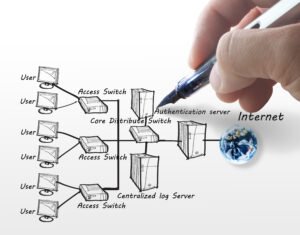As the digital fabric of businesses continues to evolve, IT consultants stand at the forefront of a transformative landscape. Rapid technological advancements and the shifting demands of a global marketplace shape the future of emerging trends in IT infrastructure. In this blog post, we will explore the key trends that IT consultants must be tuned to provide strategic guidance and ensure the resilience and agility of the infrastructures they design and manage.
IT consultants are at the forefront of a transformative landscape as businesses’ digital fabric evolves. The future of IT infrastructure is shaped by rapid technological advancements and the changing demands of a global marketplace. This blog post will examine the crucial trends that IT consultants need to be aware of in order to offer strategic guidance and ensure the resilience and agility of the infrastructures they design and manage.
1. The Rise of Hybrid Cloud Environments in IT Infrastructure
The debate between public and private cloud solutions is giving way to adopting hybrid cloud environments. These architectures combine the scalability and cost-effectiveness of public clouds with the control and security of private clouds. IT consultants must be adept at integrating these environments, ensuring seamless operation across various platforms while maintaining compliance and data governance standards.
2. Edge Computing Gains Traction of Emerging Trends in IT
As the Internet of Things (IoT) expands and the volume of data generated at the edge of networks skyrockets, edge computing is becoming increasingly important. This trend involves processing data closer to where it is generated, reducing latency and bandwidth use. IT consultants must understand how to deploy and manage edge computing resources to optimize performance for applications that require real-time processing.
3. Emphasis on Cybersecurity and Compliance
Cyber threats are becoming more sophisticated, and regulatory requirements are becoming more stringent. IT infrastructure must be designed with a security-first mindset. Consultants must stay abreast of the latest security technologies, including AI-driven threat detection and automated response systems, to build infrastructures that can withstand and quickly recover from cyber incidents. Moreover, they must navigate the complex web of compliance regulations across different industries and regions.
4. AI and Machine Learning Integration
Artificial Intelligence (AI) and Machine Learning (ML) are no longer futuristic concepts but are now integral components of modern IT infrastructure. These technologies enable predictive analytics, intelligent automation, and enhanced decision-making capabilities. Consultants must harness these tools to optimize network operations, personalize customer experiences, and drive innovation within the organizations they serve.
5. Sustainable IT Practices
Sustainability is becoming a priority for organizations around the world. IT consultants will be pivotal in developing green IT strategies that minimize environmental impact. This includes optimizing energy consumption in data centers, advocating for renewable energy sources, and implementing server virtualization to reduce physical hardware requirements.
6. The Advent of 5G Networks
The rollout of 5G networks promises to revolutionize connectivity with faster speeds and lower latency. This advancement will enable new applications and services, particularly in augmented reality (AR), virtual reality (VR), and IoT. Consultants must prepare IT infrastructures to leverage 5G technology, ensuring compatibility and performance enhancements across devices and applications.
7. Skills in Demand: Adaptability and Continuous Learning
Finally, the most important trend for IT consultants is the need for continuous learning and adaptability. The technology landscape is in constant flux, and the ability to quickly master new skills and adapt to emerging technologies is crucial. Consultants must commit to ongoing education and professional development to remain valuable assets to their clients and the IT community.
In conclusion, the future of IT infrastructure is dynamic and full of opportunities for those willing to stay informed and adaptable. IT consultants who embrace and integrate these trends into their strategic planning will be well-positioned to deliver cutting-edge solutions that drive business success. By anticipating changes, prioritizing security, and sustainability, and harnessing the power of emerging technologies, IT consultants will continue to be the architects of the digital future.

